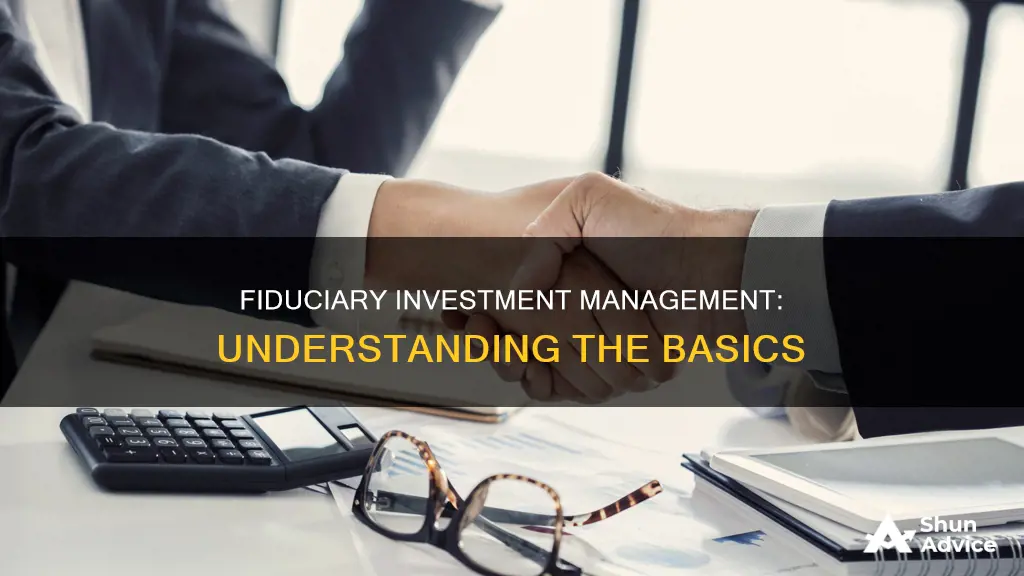
Fiduciary investment management refers to the combination of investment advice and the outsourcing of the day-to-day management of a pension scheme to a fiduciary manager provider. Trustees can focus on strategic decision-making and long-term outcomes while investment tasks are delegated to a third party. Fiduciary managers assume responsibility for investment decisions within an agreed performance framework and help clients achieve unique investment goals. Fiduciary duties are ethical and legal, and fiduciaries are required to act in the best interests of their clients.
| Characteristics | Values |
|---|---|
| Definition | Fiduciary management refers to the combination of investment advice and outsourcing of the day-to-day management of a pension scheme to a fiduciary manager provider.) |
| Who is a fiduciary? | A fiduciary is an individual or organisation who manages money and has a legal duty to act in the best financial interests of someone else. |
| Fiduciary duties | Fiduciaries are legally and ethically bound to act in their client's best interests and must avoid conflicts of interest. |
| Fiduciary relationships | Fiduciary relationships exist across many industries, including law, medicine, and finance. |
| Fiduciary financial advisors | Fiduciary financial advisors manage their client's investments in a way that aligns with the client's best interests by following certain rules and regulations. |
| Fiduciary duty vs suitability standard | Fiduciary duty requires advisors to act in the best interest of their clients, while the suitability standard allows broker-dealers to recommend products that may increase their profits through commissions but may not be the best investment for the client. |
What You'll Learn
- Fiduciary management combines investment advice with outsourcing the day-to-day management of a pension scheme to a third party
- Fiduciary financial advisors must always act in their clients' best interests
- Fiduciary duties vary by role and profession
- Fiduciary relationships exist across many types of professions
- Fiduciary duties include a duty of care, loyalty, good faith, confidentiality, disclosure, and prudence

Fiduciary management combines investment advice with outsourcing the day-to-day management of a pension scheme to a third party
Fiduciary management is a governance solution that combines investment advice with the outsourcing of the day-to-day management of a pension scheme to a third party, known as a fiduciary manager. Trustees of pension schemes can delegate investment tasks to a fiduciary manager, allowing them to focus on strategic decision-making and long-term outcomes.
Fiduciary managers work in partnership with their clients to help them achieve their unique investment goals. They assume responsibility for investment decisions within an agreed performance framework. Trustees can benefit from the fiduciary manager's investment expertise and make the most of their investment capabilities, including understanding their processes for capturing and utilising ESG factors.
By outsourcing investment management, trustees can also save significant amounts of money. Large fiduciary management providers can use their scale to negotiate more competitive rates with underlying investment managers and pass these savings on to their clients. Additionally, fiduciary managers can offer improved access to best-in-class investment managers on a global scale, enhancing investment opportunities and risk management.
Fiduciary management also relieves trustees of the daily administrative burden, freeing up more time for core business activities while ensuring fiduciary duties are still being fulfilled. Overall, fiduciary management provides greater governance, transparency, and consistency for those seeking to improve outcomes for their pension schemes and their members.
A Guide to Investing in Managed Funds
You may want to see also

Fiduciary financial advisors must always act in their clients' best interests
Fiduciary financial advisors are legally and ethically bound to act in their clients' best interests at all times. This means they must make recommendations that are best for the client, rather than themselves. Fiduciary financial advisors must also avoid conflicts of interest and act with complete fairness, loyalty, and fidelity.
Fiduciaries are required to put their client's interests ahead of their own and must not profit from their position without the client's explicit consent. This is known as the "prudent person standard of care", which stems from an 1830 court ruling.
In the financial services industry, a fiduciary is a person or firm that acts on behalf of the client and is obligated to put the client's interests first when making investment decisions. This means that fiduciary financial advisors must always disclose any potential conflicts of interest and cannot receive any compensation or benefit that is contrary to the client's best interests.
Fiduciary financial advisors must also be transparent about their fees. While some financial advisors charge a flat fee, fiduciary financial advisors typically charge a percentage of the client's assets. This aligns the interests of the advisor with those of the client, as the advisor only does well when the client's portfolio performs well.
Overall, fiduciary financial advisors are bound by law and ethics to act in their clients' best interests. This means making recommendations that are suitable for the client and avoiding any conflicts of interest. By doing so, fiduciary financial advisors can provide their clients with peace of mind and help them achieve their financial goals.
Understanding Investment: 338 Investment Managers and Their Role
You may want to see also

Fiduciary duties vary by role and profession
Fiduciary duties vary depending on the role and profession. For example, in the financial sector, fiduciaries include money managers, financial advisors, bankers, insurance agents, accountants, executors, board members, and corporate officers.
Registered investment advisors and insurance agents have a fiduciary duty to their clients. They are legally bound to put their client's best interests ahead of their own. This duty also applies to investment fiduciaries, who are responsible for managing someone else's money.
In the corporate world, directors and officers of corporations have a fiduciary duty to their shareholders and the corporation itself. This includes a duty of care, requiring directors to be well-informed before making business decisions, and a duty of loyalty, which means acting without personal economic conflict.
Fiduciaries in the legal profession include attorneys, who have a fiduciary duty to their clients. This is one of the most stringent fiduciary relationships, with attorneys held to a high standard of trust, fairness, loyalty, and fidelity when dealing with their clients.
In addition, trustees have a fiduciary duty to their beneficiaries, and this relationship is often seen in estate planning. Trustees have legal ownership of the property or assets and must make decisions in the best interest of the beneficiary.
Fiduciary duties also extend to the medical field, where doctors and other healthcare providers have a fiduciary duty to act in the best interests of their patients.
The specific fiduciary duties may differ depending on the profession and the applicable laws and regulations. However, the underlying principle remains the same: to act with integrity, loyalty, and in the best interests of the beneficiary or client.
Understanding Investment Management: The Distribution Factor
You may want to see also

Fiduciary relationships exist across many types of professions
Fiduciary duties can be found in various professions and relationships, including:
- Law: Attorneys have a fiduciary duty to act in the best interests of their clients, maintaining the highest level of trust, confidence, fairness, loyalty, and fidelity.
- Medicine: Medical professionals, such as doctors and healthcare providers, may have fiduciary duties to their patients, prioritizing their well-being and making decisions with their best interests in mind.
- Finance: Certain financial advisors, such as certified financial planners and registered investment advisors, are bound by fiduciary duties. They must provide investment advice and recommendations that align with their clients' best interests rather than their own financial gain.
- Corporate Governance: Board members and corporate directors may have fiduciary duties to their companies and shareholders, respectively. They are expected to act in good faith, demonstrate loyalty, and make decisions that benefit the company and its investors.
- Estate Planning: Trustees have a fiduciary duty to beneficiaries, where they legally own and manage assets on the beneficiary's behalf, always acting in their best interests.
It is important to note that not all professionals in these fields are necessarily fiduciaries, and the specific fiduciary duties can vary depending on the profession and the jurisdiction. However, the underlying principle of acting in the best interests of another party remains consistent across these diverse fiduciary relationships.
Transferring Your Investment HSA to Savings: A Step-by-Step Guide
You may want to see also

Fiduciary duties include a duty of care, loyalty, good faith, confidentiality, disclosure, and prudence
Fiduciary investment management involves the combination of investment advice and the outsourcing of the day-to-day management of a pension scheme to a third-party fiduciary manager provider. Trustees can thus focus on strategic decision-making and long-term outcomes while other fiduciary duties are transferred to the provider.
The duty of care requires fiduciaries to diligently gather information and make well-informed decisions that protect the interests of their beneficiaries. This involves thoughtful consideration of options and sensible decision-making based on a careful examination of available information.
The duty of loyalty mandates that fiduciaries always act in the best interests of their beneficiaries and refrain from any personal or professional dealings that may compromise their allegiance to their clients.
The duty of good faith obligates fiduciaries to make decisions that advance the interests of their beneficiaries and adhere to legal constraints.
The duty of confidentiality requires fiduciaries to maintain the confidentiality of all information relating to their beneficiaries and refrain from using it for personal gain.
The duty of disclosure mandates that fiduciaries disclose all relevant information that could impact their ability to fulfil their duties or their beneficiaries' interests.
The duty of prudence dictates that fiduciaries administer matters concerning their beneficiaries' interests with the highest degree of professional skill, caution, and critical awareness of risk.
These fiduciary duties are crucial in maintaining the trust and confidence inherent in the fiduciary relationship and ensuring that fiduciaries act with the utmost care and loyalty towards their clients.
Investment Management Lawyers: Guiding Your Financial Journey
You may want to see also
Frequently asked questions
A fiduciary is a person or organisation that acts on behalf of others and is legally and ethically bound to put their clients' interests ahead of their own.
Fiduciary investment management involves a combination of investment advice and the outsourcing of day-to-day management of a pension scheme to a third-party manager. Trustees can focus on strategic decision-making and long-term outcomes, while fiduciary duties are transferred to the provider.
Fiduciary management improves governance, allowing trustees to identify investment opportunities, proactively manage risks, and comply with regulatory developments. It also provides access to best-in-class asset managers and can result in decreased costs.
You can verify a financial advisor's fiduciary status by checking their registration with the Securities and Exchange Commission (SEC) or the relevant state authority. You can also work with a certified financial planner (CFP), who is required to act as a fiduciary.
Financial advisors have different fee structures. Some charge a flat fee, typically ranging from $2,000 to $7,500 per year, while others charge a percentage of the client's assets.







